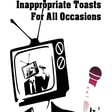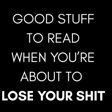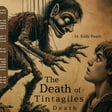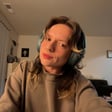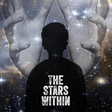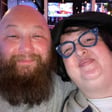Become a Creator today!Start creating today - Share your story with the world!
Start for free
00:00:00
00:00:01

Guest:Poet and Artist Quinn Rowan Dex
Artist Quinn Rowan Dex is a surrealist, a poet, a mom, and a fascinating person all around. We discuss duality in art, freedom of speech and expression, our experiences with homelessness. We drag AI art and discuss the storied history of Sometimes Hilarious Horror magazine.
And of course, there's a MadLib.
Transcript
Introduction to The Mentally Oddcast
00:00:02
Speaker
You are listening to The Mentally Oddcast, brought to you by sometimes hilarious horror magazine. Each week, your host, Wednesdayly Friday, will be talking with creators from many disciplines who live with mental illness, addiction, neurodivergence, and the impact of trauma. We'll discuss how their mental, physical, and emotional health impacts their creative goals, processes, and the things that they create.
00:00:30
Speaker
We hope we can assure all of you who live with these things that you are not alone and you can make art about it. Art helps.
Meet Quinn Rowan-Dex
00:00:52
Speaker
This week, we are talking to Quinn Rowan-Dex, and they are a professional artist and freelance writer, a poet, a mom, a nerd, and a trauma survivor as well. They're originally from the Midwest, now living in New York City with an amazing fiance, and I am told an astoundingly brilliant 12-year-old. Hi, Quinn. Thanks for being here.
00:01:18
Speaker
Thank you for having me and yes, can confirm the kid astounds me every day. That's awesome. So for people who don't know you, can you give us just a general overview of who you are?
Identity and Family Expectations
00:01:33
Speaker
Um, in a word,
00:01:36
Speaker
chaos. I was one of those people who was told that I had to be one thing and by the time I was a teenager learned that I needed in order to survive to be like 30 things. So whatever you call that is exactly who I am. Okay, I'll buy that. Now it's interesting you say that because it makes me think of a book. I don't know if you're familiar with this. The writer is Jean Shinoda Boland.
00:02:05
Speaker
And it is an examination of women and girls as described, like as the goddess archetypes. And it sort of goes through like the kind of person you are and how you will thrive in different environments. And it really takes apart the whole like, you can be an Athena girl.
00:02:25
Speaker
But if your parents want an Aphrodite, well, you're not going to have any as easy a time. And I mean, just just the connection between that, the kind of person that you are, which usually is full of like, I mean, everybody has things that they're good at in areas in which they excel. But when those are not appreciated,
00:02:50
Speaker
Yeah, there just becomes a big disconnect. You're speaking to my soul right now. No, really, when I was a kid, my grandma, bless her, love her. She's an extraordinary woman, truly. I could talk about how amazing she is for days. But when I was a kid, it was always, I always wanted a daughter and now I have you. And unfortunately, this led to a sort of idealistic vision of this sort of
00:03:16
Speaker
Image that she had of who I would be and I was a very antagonistic aggressive kind of masculine use who also discovered black lipstick in like seventh grade and I was the antithesis of what she wanted and expected and I really I threw a wrench in her life plan because she raised my brothers and I for a while through my high school experience and
00:03:42
Speaker
Again, amazingly strong woman, but she did not understand me for a minute. And so we, we butted heads a lot because she, she definitely wanted that Aphrodite. And what do you think was the long-term impact of that for you?
Artistic Evolution and Personal Journey
00:03:58
Speaker
Oh, I definitely, it took me a lot longer to discover that I do in fact enjoy things like color and flowers. It took me longer to figure out who I was as a person because I fell into that zone of thinking I can only be one thing. I was goth in high school, so it was like I can't be anything other than things adjacent to that subculture.
00:04:22
Speaker
And I had to sort of manifest building blocks of the essence of me and it took me a minute to fit those puzzle pieces together. How would you say that that impacts your art? Well, my art is
00:04:43
Speaker
kind of a reflection of the duality of me and that aspects of me still sort of hold on to the me that I was and several aspects of it reflect the me that I am so there is a bit of if you look at the timeline of my art there's a bit of a journey that is very detectable because my earliest work it leans into sort of masculine themes and like I just focused on comic book characters that I really liked and dragons and
00:05:11
Speaker
and stuff like that. And then I didn't figure out anything broader than that until much later. And I had to sort of evolve and flow with my work in a way that I didn't even anticipate in the onset. And the feminine edge to my work, as it were, I don't know of a better way to say that, didn't evolve until later. And it was difficult to find a balance in what I was trying to convey with my work versus what I was seeing in it.
00:05:40
Speaker
if that makes sense. Yes, very much so. Well, I have often said that the definition, people will ask me, how do I define success? And I will always say that it's the distance between what you were trying to achieve and what you actually achieved. That's actually a really good definition. Right? Because I mean, I was a fat, weird kid with a dumb name and a crazy family.
00:06:07
Speaker
It just, I didn't know how to measure success. All I wanted to do was like belong and feel like everybody else. And I was not remotely like everybody else. And plenty of people were only too happy to tell me that.
00:06:23
Speaker
Well, I think that your childhood character could have befriended mine. Probably. And I think that like you, I spent a lot of time rebelling against what I was told to be or to do or to think or to want, you know, and
00:06:41
Speaker
that it took me longer to figure out which parts of that were like, because, you know, if someone is abusing you, and then they ask you to do something that you really want to do, you may very well say like, like, no, well, you're an asshole. So even if I did want to do that, I wouldn't want to do it with you. So there. And then I could have done the thing, you know? Yeah, no, it
00:07:06
Speaker
It can be really hard to two parts. And that's why people talk about like, going on a journey to find themselves and people say, Well, what the hell does that mean? Why would you need to find yourself? But
00:07:18
Speaker
When you live in the world, I don't want to say this is more true for women, but this is more true for women. Oops. I guess I do want to say it. I mean, you're not wrong. You're not wrong. It's more true for, honestly, it's more true for anyone who doesn't fit that certain societal criteria. You know the one. You're the one. I'm not going to say it, but we're both thinking it.
00:07:40
Speaker
And it just is true. And when you're told you are this thing, you can only be this thing, or this is the box that we need to put you in, it takes so much longer to figure out who you are and what you can do in society. And no one stops to think for just a second that if they just said, just discover it on your own, people would get there a lot faster and a lot more successfully. It would reduce the hurdles exponentially.
Societal Pressures and Personal Choices
00:08:05
Speaker
And it's so frustrating.
00:08:08
Speaker
Expectations that we put on other people like for no real reason can just be so crushing. I don't know if you saw recently, there were some remarks from Seth Rogan that came back around that he's very happy not having children. And I do not have children. That has had some pluses and minuses for me, certainly, because I would have liked to have had at least an opportunity to explore that.
00:08:33
Speaker
But people are very upset with him for not having had children. And that is, to me, it is, I mean, it's one of the most personal decisions. And my God, you certainly don't want to have that foisted on you, Congress. First, before we go judging Seth Rogen for not having kids, can we just commend him for not inflicting children on a woman and then abandoning her? Okay. Yeah. Yeah.
00:09:03
Speaker
No bar, but I'll take it. Listen, the low-hanging fruit is there and I want it. I'm hungry, okay? We need the sustenance. It's limited, but it's there. We are starving.
00:09:18
Speaker
Like, it's just the way that the world wants to force women, and not just women, but anyone with a uterus, to have children that they did not plan for, did not sign up for, and frankly, in some cases, don't want, is disgusting. And the fact that people want to say, my body, my choice, with one mouth, and then turn around and say, but why isn't he having babies? And she's like, excuse me, excuse me. It's freedom of choice for everybody, for everybody. If he doesn't want kids, he doesn't have to have them.
00:09:47
Speaker
Indeed, indeed. And it sort of goes back to this whole like, people giving advice and putting expectations on other people that they do not live up to themselves. I'm a double standards. Well, I'm a sex writer. And so when whenever Pornhub has a new report on their like searches and stuff, I always get a kick out of looking at it.
00:10:10
Speaker
And once again, guess what? Red states search for more LGBTQ porn than these states. Oh yeah, than anywhere else in the world. They go ahead and they say, you can't do this, you can't do this. And they try and make all of the laws fit exactly inside of the four walls that make up our bedrooms. But what are they doing in there?
00:10:30
Speaker
Well, and you know what, I don't, I don't care what people do. I mean, I, I'm one of those people that says, if everyone's an adult and everyone is giving informed consent, which means no one is being lied to about anything, people should be left alone to do whatever the hell they want. And yet.
00:10:50
Speaker
people get so angry about drag queens and gay people and trans people because they are cowards who are afraid to come out or afraid to you know even discuss like what they're feeling or you know like dudes with their mean abusive dads that would never even consider that they might be bi or gay you know like that whole thing it's all that they're comfortable with something and that makes them uncomfortable have you noticed that like yeah I'm bothered that this didn't bother me
00:11:19
Speaker
But I mean, just the rage, there's so much frigging rage. And it's, I mean, some people are mad because the world is becoming a terrible place. And some people are mad because the world is becoming a more inclusive, more accepting place. Like, Oh my God, I used to slur at work and now that I got in trouble because we don't have free speech anymore.
00:11:42
Speaker
Like, buddy, if nobody arrested you, your speech is not in danger. Exactly. And people don't understand that that is not freedom from any consequence at all. That's not what it means. And the fact that people in 2024 can't grasp what that means makes me wonder what has happened to the quality of the school system in this country. We know what's happened to the school system. Oh, we know. So one of the things that we focus on here on the Mentally Odd Test is talking about
Understanding Neurodivergence
00:12:10
Speaker
mental health issues, neurodivergence, trauma, addiction, all that good stuff. So where are you with all of that?
00:12:20
Speaker
Well, I check a lot of those boxes. Let me tell you. As you know, I mean, we talked about the fact that I am autistic and I have ADHD. I'm not medicated for my ADHD. I try and do more lifestyle maintenance. Is that always successful? Not at all. Not at all. How old were you when you were diagnosed with ADHD?
00:12:46
Speaker
I was an adult. I was an adult. It did not happen until my mid-20s, but it was discussed when I was a child from my understanding. You know when teachers and school staff start wondering things and they pull you out and they have you talk to someone and sit and color things and answer some questions and it's real awkward, and then you go back to class and you don't really know what it was about?
00:13:14
Speaker
And then you get home and your mom screams at you. Oh wait, maybe that was just me. And asks if you've been acting up at school and were you not paying attention and... Are you on drugs? Yeah. You know this stuff. You know this stuff.
00:13:28
Speaker
And then you never knew, I never knew what that was about. But anyway, once the pieces were put together when I was an adult, it made a lot more sense because I knew I had anxiety. I knew I had depression. I'd been told CPTSD by that point.
00:13:44
Speaker
But knowing the rest made some things about my personality make a lot more sense to me. I don't understand a lot of social concepts that I probably should have grasped when I was a lot younger. And being able to give myself a little grace in that department was huge, huge for my social development.
00:14:07
Speaker
I as much as it came with a lot of confusion and trying to understand how it like how it would affect my life at all if it would change anything more than anything it just made me happy to be able to understand myself a little bit more. I think what you describe is really common actually because a lot of us
00:14:28
Speaker
aren't tested when we're young. If we get therapy, it's just to make sure we behave at school. It's not necessarily to help us or to get to the bottom of issues that we might be having. I was in and out of the counselor's office in high school because of spooky poetry and
00:14:47
Speaker
okay yeah being suicidal and it's just like i feel isolated and this is how i'm communicating it and instead of trying to communicate with me you are further isolating me by pulling me out of class to discuss this with you it's awkward girl say i i was also the kid that was like
00:15:05
Speaker
I talked about suicide constantly and I don't think at that point I even really wanted to do it. Like there were moments, but as a general state of affairs, I think that I use the idea of suicide to
00:15:20
Speaker
pretend that I had some kind of control in my life. Cause you know, when you're a kid, you're, you're trapped, you know, whatever people you end up being born to, you're just, you're just stuck there and it is, and you don't think you'll ever get out. And so the idea that like, well, I could kill myself, but I'm not going to, cause I'm making this choice to do this in the hopes of, you know, whatever.
00:15:42
Speaker
It feels like a coping mechanism, but it's not. And people don't really hit it because I would write these long, what is essentially a suicide letter of explaining why I felt like I just couldn't freaking take it, but then I'd either burn it or tear it up or whatever. Yeah.
00:16:01
Speaker
Like, I would write some really dark and just tragically honestly terrible poetry about just not wanting to exist and not wanting to be solid. I had this big thing about wanting to just dissolve into dust. It was very dramatic, very Lydia Dietz.
00:16:20
Speaker
And I just, I could not separate that tragic, just sad poet image from my visage ever. It was just a part of me, especially when I was a teenager, because it's just...
00:16:36
Speaker
The word and the writing, it is just, in hindsight, it feels like such a desperate attempt to just understand and put things into a perspective of framing that somehow makes sense. And that's why
00:16:51
Speaker
i think when we finally get our diagnoses it's a relief it's not nothing it's not i haven't been trying it's not i'm just broken or i'm just bad like there are reasons that things like this are happening reasons we feel this way reasons we process information that way and once we understand why
00:17:11
Speaker
you can look up that giant hill and begin the long climb to, oh, there are things I can do about this. Well, let's start some trial and error and see which things work for me. Yeah, exactly. Which things work for me part being very important. Well, yes, because there are a lot of people who are not neurodivergent or mentally ill, and they seem to think that, oh, there's a medication. Well, you should take it, and then you won't be sad anymore.
00:17:38
Speaker
Yeah, yeah, if it was that easy, we'd all be doing it. You know, we'd all be sunshiny, happy people. Well, yeah, it's right up there. We just give lunch and you'll be skinny in no time. No, it's these things are not, you know, these things are more complicated than people who have not been there. Very much so. So
Art Style and Inspirations
00:18:02
Speaker
Getting back to your art, how would you describe your overall style? Is there an overarching theme to it? Somewhere between... I want to say it's organic, but lately it's been very geometric forward, and I think the main word that comes to mind is just surreal.
00:18:26
Speaker
I'm really enjoying just over the past almost two years now, just exploring where it takes me. I lean into themes that are more based in nature, but then I embrace. My high school geometry teacher would just be laughing up a storm right now that I use geometry in my art. I'm just going to say that right now because I do. I actually have a piece I'm working on right now.
00:18:48
Speaker
where I it's like the um just the outline of a d20 die was referenced and it was I literally had to study the angles and I just started thinking about my high school geometry teacher who had to let me retake my final because my slacker butt was not doing so hot and uh math is a main trick they play on creative people
00:19:11
Speaker
Because you're fine until they introduce the alphabet. And that's when it just all goes downhill. There's no hope once the numbers and the letters start co-mingling. Look, if I can measure for carpet and cut a recipe in half, that's really all the math that I require. What else is there? Why? Unless you like it.
00:19:31
Speaker
Listen, I loved math when I was a kid. I had that Matilda thing going on with the big numbers in my head. And then again, ABC one, two, three, what was me? I had no idea what to do with myself. Just, I was gone. I will say I missed most of fifth grade because apparently my mom just had other things to do, but I missed most of fifth grade. And I think that might have been where it all went wrong for my academic development.
00:20:00
Speaker
Just, I don't think I ever completely caught up. Wow. That's, that's huge. So a lot of, uh, of geometric patterns. I'm trying to give people a sense of the work, like what, what music would go with your work? Like if I were, if you have an art show and you want music that specifically compliments and enhances your work, what music would that be?
00:20:24
Speaker
Okay, it might not make sense to anyone but me, but I have a playlist and being able to remember every artist on there is never going to happen, but most of these songs are pulled from the bubble grunge playlist on Spotify that I got recommended on my day lists. And so there's like a soccer mommy and
00:20:48
Speaker
Oh gosh, who else did I have in there? The beaches is really good. And then I listen, I play also a lot of 80s pop stuff and then 90s grunge when I'm doing art. Because again, somewhere between, I don't know, that place where an industrial complex gets overrun by a garden.
00:21:15
Speaker
Poison Ivy would love my work, I feel. Wow, that is dope. We're going to have some links in the description, of course, but if people are not familiar with your work, where should they be going to get it? I know you're on social media because I met you on Facebook.
00:21:33
Speaker
right there on facebook my aviv artistry page it's got like everything from from just the past couple of years like i basically after after covid in 2020 and and having long covid for eight months i sort of had to relearn how to art um so everything on that journey is there so you can see me struggle and then finally remember oh this is how this is how my hands work
00:21:59
Speaker
And finally get it back and so that that would be a great place to start beyond that might eat My coffee link is a great place to see what I've worked on more recently I haven't uploaded a lot of the older stuff yet. I intend to but you know busy be
00:22:15
Speaker
Are you having good luck on coffee? Because we're there. The magazine is there. Sometimes hilarious horror. Yes, I do follow you. I have some luck on coffee. I do. If nothing else, it's been a great place to network with other creative types and to see stuff that other people are working on and promoting. I make a point to try and share other people's links and people share mine.
00:22:40
Speaker
It sparks a conversation about each other's work, if nothing else. And sometimes people, you know, kick me a cup of coffee and it's, it's really sweet. And it's always, um, it's always a big help when anyone makes a contribution. Cause I mean, you know, existing in the art world, that phrase starving artist becomes a lot more real. Well, writers don't do much better if I can be honest with you, especially now, my God, AI is just trouncing us because all of
00:23:06
Speaker
All those low level writing jobs you used to get, like SEO and catalog writing and stuff, all that stuff is being done by AI now and it is.
00:23:15
Speaker
not good. It's not good work. It's not good for writers. So no,
AI Art Controversy and Ethics
00:23:20
Speaker
it's not. And I got to tell you, I have actually given up on looking I was looking for, like a staff writing job, something just really low level that I could find. Nothing that I qualify for is technically available to me anymore. And it's it's been so frustrating. And and now with AI art being art quote unquote. But
00:23:44
Speaker
AI art being as prevalent as it is, it's been just disgusting if I'm being perfectly honest with you. It's such a violation and to see people defending it, it's one thing to be inspired by an artist and it's a whole other thing to just take from them outright.
00:24:04
Speaker
It's not the same thing as Photoshop. I've heard that argument and it's not the same as editing. I've heard that argument too. Well, it's wild because I very much thought a lot of it was like Photoshop initially. Because I mean, you could take a photograph of something and put it into Photoshop and make it look like a drawing. So I thought that that was predominantly what was happening. When we first started the magazine, our first volume,
00:24:30
Speaker
We did use some AI art for our covers, because I couldn't afford artists. I was not paying anyone, because we had like no money at that point, and I didn't, you know, I was still using that phrase that people use I was calling it AI art, and in fact it is not art because art
00:24:49
Speaker
I maintain that art has to be made by a person in order for it to be art and not like craft or product or something more. Yeah, I mean, it's a product.
00:25:05
Speaker
You know, it's like a visually made product. And sometimes people need visually made products for this or that. But if you're talking about art, if you're talking about like, when I started the magazine, it was just a way for me to put up stories every week. That was, I had a Patreon, I did a new story every week. It was supposed to get me writing. And when I decided to bind it all up into a magazine, I said, well, this is stupid to just do for myself. I need to get some other writers in here and start putting people on blast.
00:25:35
Speaker
And so with that in mind, it made sense to say, well, I just need some cover art. I guess I'll just, you know, get whatever and we'll put it into something great. And the first three issues were just like different snippets of AI art put together to become a cover. And then people started saying, Hey, you know, that's like stolen work, right? You know, that AI is, they take stuff without permission and they, they scramble it up and use it. And I think there was a.
00:26:05
Speaker
a point at which someone had said that they proved that their art had been stolen, but then that turned out to be a hoax. And I was like really confused about what, cause you know, visual art is not my area of expertise. I'm a writer. And so I didn't really understand all the nuances that were going on. And I do have some friends that are professional artists and they like make a lot of money at it and
00:26:30
Speaker
they have told me that no, AI art is not something that I should be using. So as of actually I think the last issue of volume one was not AI art and then going forward volume two on no more AI art, even if it means I end up putting a picture of my cat on the cover, we will not be using AI art.
00:26:53
Speaker
No one says no to a picture of a cat anyway. We all love cat pictures. That's what made the internet. We all know this used to be lol cats in farmlands as far as the I could see. That is so true. That is so true. Um, so yeah, so I'm with you on the whole AI thing. I mean, but I think we're gonna get
00:27:16
Speaker
I think we're going to get past it. I think that people, it will make people recognize like there might be like, I just, I can't get my head around the idea of wanting to read a novel that wasn't written by a person. Like what is the point of it?
00:27:33
Speaker
It doesn't have any heart attached to it. So I can't imagine reading a book that was written by AI. How do you fall in love with the characters? How is it not entirely one dimensional and flat? How does it create a universe that has no imagination? Well, meaningful themes? I mean, what?
00:27:52
Speaker
So yeah, I don't get it. I would honestly like for some intelligent person who I respect intellectually to explain to me the value of reading a book that was assembled with AI. I don't doubt that developing prompts is some kind of a skill. I'm sure there's some skill there that I am not fully appreciating. It's not the same as writing a book or creating. I will never acknowledge the skill
00:28:20
Speaker
I will denounce it that there's skill involved. No, I just want to argue. Well, when I first became aware of computer animated graphics and stuff, I didn't fully appreciate the skill. And my husband, he's a big gamer, and he's also our graphics designer. And so he explained to me that, no, these are just, it's the same skill using different tools. And that is true of things like Photoshop and Illustrator. Well, yeah, that's true.
00:28:49
Speaker
I feel like anyone can punch in just a prompt and make something come out. And the only reason that I think that is because of the number of people who did dabble with it have told me how easy it was.
Quitting Smoking and Drinking
00:29:04
Speaker
Getting onto a completely different topic, you used to drink and smoke cigarettes, and now you don't. How's that going? I did.
00:29:11
Speaker
Um, I smell better. No, it's, it's, it's, it's great. I mean, it's hard. Don't get me wrong. I still think about smoking, uh, fairly often. And it, I still sometimes think if I was a drinker, I sure would need a drink right now. And I know that that is that part of me that still wants the thing, but, um, you know, sometimes when you just decide something, that's all you need to do.
00:29:39
Speaker
It's not often that it's just that, but sometimes when I just decide a thing, it's enough. And when I just decided I was done, it turned out to actually be enough. So it's going okay. That is fantastic. I had tried to quit both a few times, but this last time actually seems to be the time it stuck. No, were you the drinking
00:30:03
Speaker
all the time kind of drunk or were you the I don't drink for days but then once I get a drink in my hand I don't stop kind of drunk.
00:30:11
Speaker
Oh, porque no los dos. So I would actually, I would have periods of both. So sometimes if everything in the world was going wrong, it was like every night I needed that. And it wasn't ever just, I want that. But then I would go through periods where it'd just be like, you know what? I just really want to let loose and have a few drinks. And a few drinks would be an entire bottle of vodka. And that's not great.
00:30:39
Speaker
Um, and then once, uh, you know, there at the end, it was just like, I'm drinking a bottle of wine. And then, uh, New Year's Eve finally happened. And I had a couple of sips of a drink just with some friends of mine for New Year's Eve. And my stomach instantly hurt just after a sip. And I was like, you know what? I am done with this. And I was done with that.
00:31:03
Speaker
And how long ago was that? That was New Year's Eve 2019. So, okay. Well, I would imagine like, again, I don't have kids, but I would imagine that addiction issues hit much differently when you have children that can appreciate what you're doing.
00:31:21
Speaker
Yeah, quitting smoking cigarettes, because unfortunately, my child was aware that I smoked cigarettes. But when I quit smoking, that was a big deal for my kid. They were very happy that that was the thing that I did. And so that I think helps motivate me to just not do it again.
00:31:44
Speaker
Yeah, I would think that one of the main side effects that I would not like of parenthood is just having the kid exist in front of you would guilt you out of doing a lot of things that you... Oh yeah. Particularly things that you know you shouldn't be doing that you want to do. Mm-hmm, there's that and then there's also the terror. Because being a parent is... What happens if they do it?
00:32:10
Speaker
Oh, just what happens if anything? Just what happens if anything? The world becomes so much more terrifying when you have a child. Because it is like wearing a sign that says, I am twice as vulnerable now, I am slower, and I have something to lose. Hi world, it's me. And that's horrifying. Because it's just, you want the best for your kid, you want the world for your kid, and then the world turns out to be scary and you're like, hmm, what world do I want for my kid? Not this one.
00:32:40
Speaker
Yeah, I mean, I can't even imagine like, I think if I had a kid, I would just be afraid just to send them to school. You know, there's all these people that are, I mean, school shootings are just insane. And then when people come up with ideas, it's like, oh, well, let's put another gun and make sure every classroom has one so the teacher can shoot a student if he starts like, what? I don't.
00:33:04
Speaker
I don't understand any of it. It's horrifying. It keeps me up at night. It trusts me. The glittering incompetence with which we as a country are dealing with these issues is very frightening. It's nightmarish. Listen, if anything can make you freeze in horror, it's the thought that your kid might not be safe in a place that is just full of other children.
Children's Safety Concerns
00:33:27
Speaker
that it's it's a school it should be it should be like a sacred place for your kids to go and just you know that they're safe if they're safe anywhere it should be safe in a school amongst their peers with teachers and counselors and people who are supposed to have their best interests at heart and you really have to question those interests when the first solution that comes to anybody's mind is more guns well i mean
00:33:52
Speaker
There's literally a movement against empathy in this country right now as we speak. There are people that will, like there's always been a few people that openly mock empathy, but most of them like peaked on a high school football field somewhere and have been trying to get that smug, jockfully feeling back ever since. But for the most part, the world is a frustrating place. And the thing is that sometimes it seems like people that are neurotypical
00:34:21
Speaker
They, uh, I think they have an easier time accepting, like, the craziness of the world. They seem less bothered by a lot of things. You know, I sometimes wonder if that has something to do with the fact that they don't have the same pattern recognition software that we seem to be installed with.
00:34:38
Speaker
yeah they don't see when they do the same things over and over again and expect different results and then they call us crazy it's like but the very definition though bro what so in addition to visual art i know that you are also a poet and poets are generally
00:34:56
Speaker
I mean, every poet that I've ever talked to is a poet because they have a whole lot to say. And I've been talking to you for less, you know, however long it's been, and you clearly have a lot to say. So which parts of that make it into your poetry? Is it dealing with your mental goings on? Is it life in general? Is it about the art? Like, how did you get there?
Poetry as Emotional Processing
00:35:21
Speaker
Well, I started writing poetry when I was little and it is actually one of those things that I will say I have in common with my mother. I don't associate really with her at all and that's fine. She's in her part of the world and I'm in mine and that's okay.
00:35:38
Speaker
But she is also a poet. And I remember enjoying her poetry when I was little, and I started trying to write my own. And as I got older, all that came through my poetry well at all was the stuff that hurt. I couldn't write happy, I couldn't write sweet, but I could write about the worst things that had ever happened to me that I'd ever seen, that I'd ever heard, that I'd ever felt.
00:36:04
Speaker
I could make it a poem, whether it was a sonnet, whether or not it was a haiku, whether or not it was basically just slam poetry that exploded on my page like my pencil exploded. It was always something that I was, I guess, trying to process in the moment. Eventually. So it sounds like the poetry served a need.
00:36:30
Speaker
Oh yes, yes, yes, yes. My best, my best work was done, I swear, pre ever going to therapy. And then some of my more less structured in need of more development, but more, I guess, profound stuff was post therapy. When I finally understood what I'd been writing about. Let me ask now. I think a lot of people talk about.
00:36:55
Speaker
using art as a coping skill, but also being encouraged to sell their art and to make everything that they enjoy doing creatively a bit of a side hustle.
Monetizing Art in Capitalism
00:37:06
Speaker
Do you have any thoughts on that?
00:37:10
Speaker
Unfortunately, that is the societal expectation when you live in a capitalist dystopia such as this, you know, high world, know thyself. And my thought on that is honestly that it sucks because it's true. I wanted to be a writer when I was a kid. That was like my end game.
00:37:29
Speaker
I still hope to one day publish a book of my poetry. It's something that I've been working on organizing for the past few years. And I'm actually almost done making my initial selections of which ones I want to develop and stick together to try and turn into something. But I have had to focus so much more on the art because it was the skill that was marketable. It was what I could do a little bit more successfully. It was what was opening more doors for me.
00:37:58
Speaker
than writing or even freelance editing work was. So I had to lean into it more. And while it's been fun and I do enjoy my work, it means a lot to me. I do wish I could have been able to harness my writing a little bit more along the way. And I'm still going to keep trying to, but the world's working against me a little bit.
00:38:26
Speaker
Do you think that there is value in sharing the work versus keeping it to yourself? Oh, I think that depends a lot on what you want to happen to your work and what you want the world to see. I have some work that I don't really share. I did a Nightcrawler drawing for my fiance for Valentine's Day.
00:38:53
Speaker
I didn't post it, even though I was decently proud of the work I'd done on it, because that wasn't for anyone but him. I'm not trying to market drawing superheroes on the regular anymore.
00:39:10
Speaker
because that was me trying to draw what everybody would have wanted me to. I love superheroes. I love comic books. I love me some cartoons and that's what I made my focus because I was just like, hey, a lot of other people do too. I can do that and it'll go. And it did as Prince at comic conventions and stuff and it was fun, but
00:39:37
Speaker
uh it was kind of not enough it was it was too niche it was too one thing and i got burnt out and i i had to i had to completely reinvent my work wow that is huge it was a cluster fuck well when you need inspiration where do you look are there other artists that you look at or do you go out in nature like you don't strike me as a nature person but maybe
00:40:07
Speaker
Ironically, I actually love nature. I just tend to fall down in it a lot. I'm not going to lie. I am very clumsy, but I do actually love me some outside time. I just unfortunately am, again, afraid of the world, so I can't always enjoy it the way that I'd like to.
00:40:24
Speaker
My kid was a big inspiration for me and then also my fiance has been as well. I've leaned into some themes that have been really fun to discuss with him because he's actually, he went to school for art.
00:40:40
Speaker
so and he doesn't really do a lot with it now but it's still a lot of fun to sit and have someone to like sketch with from time to time and to bounce some of my dorkier ideas off of and see someone get excited about it because that just makes it so much more fun like he he gets really like like stoked about something that i'm drawing and it just it it brings me joy
00:41:05
Speaker
I guess Marie Kondo would say I should keep him. I totally get that. My husband and I, we've tried to write together a few times and it doesn't really work out I think because we're both like
00:41:18
Speaker
Like I'm afraid of steamrolling him because he's, he's the quiet guy. He's the quiet, logical one. And I'm the crazy loud one. Um, Oh my God. We haven't had a lot of luck writing together, but we do have like, you know, with the magazine, he does the covers. And if we need internal graphics, he'll do that. He does, you know, like all of my graphics and he does my book covers now. So we.
00:41:44
Speaker
collab on projects without directly working together. And that seems to work okay for us. But I would love to flow well together but you don't write well together. Pretty much, I think, because, you know, when I'm writing something, even I don't know where the hell it's going to go.
00:42:00
Speaker
So he'll ask me questions and I won't have any answers for him. And he's like, well, how am I supposed to write if I don't know any of these things? Like, well, how am I supposed to know these things if I haven't written them yet? I have to put the pen to paper first and then the ideas will be there. No, I actually find out.
00:42:17
Speaker
you make like outlines or character sheets, like I'm huge with character sheets. And then- Oh, I love a good character sheet. I considered myself a novelist for a long time and I hadn't written a novel in so long because I started writing for a living. And once you write all day for work, it's less fun to write fiction in the evenings. But once I became- Insert joke about gynecologists here.
00:42:41
Speaker
Um, well, that's really funny because I was a phone sex operator for a long time in the, in the nineties and beyond. And that is one of those things that there's actually a movie about that, about a man who kills women because his wife is a phone sex operator and she doesn't ever want to talk sexy with him because she's just sick to death of it by the time he gets home.
00:43:00
Speaker
This is a Seinfeld episode. The little more murderous than most Seinfeld episodes. Not the crazy people. They were due for a spooky Dexter season. That's why I could have revitalized the show. Newman on a rampage? I'd pay good money to see that. It would be Newman, wouldn't it? It would.
00:43:28
Speaker
I'm a great fan of Wayne Knight. That guy cracks me up. He really does. I think he's swell. Hear that, Wayne Knight? Come on my show. Yeah, come on our show. There's actually one more thing that you and I have in common that I wanted to touch on briefly is that you and I have both been homeless at one time or another. And I'll tell you, but I think we also share when we hear people
00:43:55
Speaker
describing homeless people in negative and victim blaming kind of ways. We both like to pipe up and say, you know, when I was homeless, I felt that blah, blah, blah. And to be real honest, I was not homeless for very long. I mean, I really only had about a week and a half of like, I don't even have a friend that could crash on their couch. I need to stay in a shelter. And I stayed in a women's and children's shelter, one of the secret ones.
00:44:21
Speaker
so your abuser can't like come find you. And I was like, you have to earn your keep at those places if you like don't have a job, which at the time I was not working. So I was cooking for like 40 people at a time. It was like, it was kind of amazing because when I was homeless, I felt really, really shitty about myself and my situation, even though I left an abusive situation. And then another one, like right after that,
00:44:47
Speaker
And I felt super like a failure. Cooking for 40 people will make you feel real good about yourself, even if the picky kids don't want to eat it. Yeah, I'm a big believer in acts of service. But what was your homelessness experience like?
Experiences with Homelessness
00:45:04
Speaker
Well, it was about a year, a little more than.
00:45:10
Speaker
And it wasn't my favorite time of my life. It was dark and lonely. I had a few really good friends that
00:45:22
Speaker
Um, kind of kept reminding me which way up was, um, I made friends with someone who lived in Brooklyn at the time who talked baseball with me when I was sad. Uh, a friend of mine who lived in Manhattan, like came out to see me and, and bring me matcha crackers and snacks when I was feeling down and just, you know, I had a few solid people looking out for me, like a friend of mine had actually helped me even get out here from where he had been and, uh,
00:45:53
Speaker
But it was scary and I was in a bit of a rough area that I was not at all familiar with. And so every day was its own little side quest mini adventure of just trying to make it to nighttime. Because again, very anxious person, but I had to be existing out in the world all at once.
00:46:15
Speaker
And I made it through it and I met my now fiancé while I was in that situation and we met and it was just like, hey, this is what my life is like. Take me or leave me.
00:46:31
Speaker
we're still together and I'm out of there now and things are looking a lot better but it took its toll on me and yeah I'm still recovering from that experience and a lot of people don't even know that that was my experience and if they listen to this podcast it will be the first time that they know I went through that at all so
00:46:57
Speaker
Well, that's really great. I thank you for sharing that with us, because that's not always an easy thing to talk about. I've reached the point in life where I give approximately a negative amount of fucks when people want to judge me or my past or whatever, because I'm at peace with all of it. But still, you know? With regards to that, what is it?
00:47:20
Speaker
Yeah, well, I'm braced because at the end of the day, what are they going to be judging me for? They're going to be judging me for having been put in a difficult situation after placing my trust in someone I should have been able to. Long story for another day. Or they're going to be judging me for surviving a very difficult transitionary period, getting myself and my kid through a very dark time. They will be judging me for getting out of that situation and keeping my skin on and my sanity.
00:47:50
Speaker
remotely intact. They will judge me for having survived and now even attempting to thrive. They will judge me for making something of myself while I was being told by society that I was nothing. And they will judge me for being one of those people that they wouldn't have been able to identify as homeless when they saw me on the sidewalk because nobody ever knew. They just, they just saw me, but they didn't see me because nobody knows. Wow.
00:48:19
Speaker
I want to give people a minute to think about that because that is huge. That is just huge. So I don't even know how to move on after that. That was enormous. So what advice would you give to people who struggle with the things that you've struggled with?
00:48:41
Speaker
you know, whether it's homelessness or addiction or mental health, like what advice, what have you gleaned from those experiences that you could use to help someone else who has not been there, who hasn't gotten to the other side of the struggle?
00:48:58
Speaker
But if you're still on the way down, you have to keep falling before the fall actually stops. You can't stop mid-fall. It doesn't work like that. You have to acknowledge where the floor actually is and that, hey, you found it. And you have to be willing to admit that to yourself that, hey, honey, you're there. It's that little dark place we all call rock bottom.
00:49:22
Speaker
You got to land there before you can actually remember which way is up. Otherwise you are just Alice on your way to Wonderland and everything is up, down and sideways and nothing matters and time doesn't exist. You can't get better until you realize that you're at your worst. Otherwise you don't even know what better is. You have to admit that it's bad.
00:49:48
Speaker
Yeah. And I think admitting that something needs to change, you know, cause there's also that sense of, you know, as soon as this thing gets better, as soon as that thing, you know, like if I get a better job or I beat a better person, would it like, there's some sort of external thing that needs to happen as opposed to saying, no, I need to change my behavior because whatever I am doing is not working.
Accepting Struggles and Recovery
00:50:12
Speaker
Exactly. And that you have to.
00:50:15
Speaker
It can feel impossible, but half the battle is, yeah, of course, address the external stuff that's given you a hard time, that's making life a little bit too challenging, but you have to address the why it's hard. Why are you struggling with that thing so much? Because if you're not looking at yourself and trying to figure out how to accommodate your own best interests, you're not going anywhere. You're just taking yourself backwards.
00:50:41
Speaker
And the thing about mental illness and addiction is a lot of times it keeps us from self-evaluating in that way. Oh, yeah. Yeah, definitely. Certainly. Yeah. All right. Wow. This has been just great. I love this interview.
Conclusion with Madlib Game
00:50:57
Speaker
I love how this turned out, but now it is time for the Madlib because we end every interview with a Madlib because we have to because Madlibs are great. So are you ready? You ready for the Madlib?
00:51:10
Speaker
I think so. I'm really hoping I remember my grammar skills and everything. Oh gosh. Well, this one's kind of easy actually because it's a whole bunch of mostly nouns and adjectives. So why don't you throw about six different nouns it made. Make the first one plural. Oh geese. Okay. More nouns. Um, hot dog. Okay.
00:51:36
Speaker
Giraffe, I don't know why. Train, ball, coyote. Looks like I need two more now. New Mexico, casino. Okay, and I need two, three, four adjectives. Fast, right? Yep.
00:52:03
Speaker
Pretty, slimy, mischievous, irritating. Now I need a verb ending in ING. Snoring. And one more verb, but not ending in ING, just a regular one. Facts. Okay. So now we have it. Here we go. I'm going to read it and you prepare to be hilarious.
00:52:33
Speaker
Um, so this is about, uh, this is called cool it, and it says weather plays an important part of our daily geats. What is weather anyway? According to fast scientists who are known as meteorologists, it is what the air is like any time of the hot dog.
00:52:54
Speaker
It does not matter if the air is cold or hot or pretty, it's all weather. Weather changes from hour to giraffe and from day to train, from season to ball and from year to coyote. Daily changes in weather are caused by slimy storms snoring across the earth. Seasonal changes are from the earth moving around New Mexico.
00:53:20
Speaker
Which I think that helped. We learned something different. Right? When the vapors in mischievous clouds condense, we have casinos and snow. Whether you like it or not, whether it's here to fax. I mean, someone's going to be faxing, right? Irreverence. Okay. Well, Quinn, thank you so much for being here. It was really great having you.
00:53:47
Speaker
This is Wednesdayly Friday and we are the Mentally Oddcast. Find us on Ko-Fi. Sometimes hilarious horror. And we will see everybody next week. Thanks.

